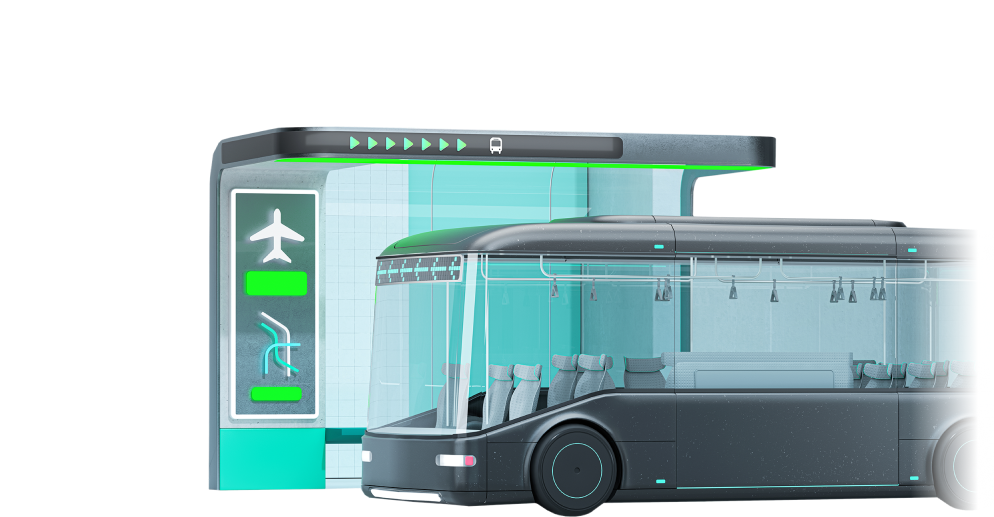

Smart cars are safer and more comfortable than previous-generation cars. They help their owners park, keep a safe distance behind the car in front, and with over-the-air (OTA) updates they can support entire ecosystems of applications and additional services for drivers and passengers.
Advances in technology, including 5G networks as well as communications and interactions between vehicles and the environment (V2X), will allow smart cars and trucks to factor in more and more data about the environment: other road users, the weather, road signs and markings, road conditions, and other factors. But it is internet of things (IoT) technologies that allow smart cars to fully interact with one another and with the road infrastructure. Autonomously exchanging data, quickly processing it and responding to the results, smart devices form an environment where the chances of unforeseen road situations are minimized.
Experts predict that by 2023, 69% of all cars sold globally will be able to “talk” with one another and external sources, which will give an impetus to rapid growth in new services and business models on automotive markets. Leading car manufacturers and IT companies are working closely on self-driving cars and expect them to appear on public roads in the coming years. The proliferation of autonomous vehicles, both cars and trucks, will cause very noticeable shifts in people’s lives and in the economy as a whole.
Modern cars are much more complex than just electromechanical vehicles: they are entire infrastructures that can connect to various cloud services and incorporate mobile control applications, driver assistance services and more. The security of such complex systems should be treated very carefully.
The consequences of successful attacks on smart cars can be very serious. Compromising telematics or head units can lead to leaks of drivers’ personal data, ranging from bank details and passwords to audio recordings of conversations held inside the car. Unauthorized access to control systems can threaten the lives of passengers and other road users.
Kaspersky closely follows the trends in the automotive industry to offer tools for building efficient, convenient and secure solutions that will allow drivers and passengers to enjoy all the benefits offered by connected vehicles.
Smart cars are safer and more comfortable than previous-generation cars. They help their owners park, keep a safe distance behind the car in front, and with over-the-air (OTA) updates they can support entire ecosystems of applications and additional services for drivers and passengers.
Advances in technology, including 5G networks as well as communications and interactions between vehicles and the environment (V2X), will allow smart cars and trucks to factor in more and more data about the environment: other road users, the weather, road signs and markings, road conditions, and other factors. But it is internet of things (IoT) technologies that allow smart cars to fully interact with one another and with the road infrastructure. Autonomously exchanging data, quickly processing it and responding to the results, smart devices form an environment where the chances of unforeseen road situations are minimized.
Experts predict that by 2023, 69% of all cars sold globally will be able to “talk” with one another and external sources, which will give an impetus to rapid growth in new services and business models on automotive markets. Leading car manufacturers and IT companies are working closely on self-driving cars and expect them to appear on public roads in the coming years. The proliferation of autonomous vehicles, both cars and trucks, will cause very noticeable shifts in people’s lives and in the economy as a whole.
Modern cars are much more complex than just electromechanical vehicles: they are entire infrastructures that can connect to various cloud services and incorporate mobile control applications, driver assistance services and more. The security of such complex systems should be treated very carefully.
The consequences of successful attacks on smart cars can be very serious. Compromising telematics or head units can lead to leaks of drivers’ personal data, ranging from bank details and passwords to audio recordings of conversations held inside the car. Unauthorized access to control systems can threaten the lives of passengers and other road users.
Kaspersky closely follows the trends in the automotive industry to offer tools for building efficient, convenient and secure solutions that will allow drivers and passengers to enjoy all the benefits offered by connected vehicles.
The smart vehicle industry’s pace of development dictates new rules for building IT solutions for connected cars. Since a car’s on-board computer systems are directly or indirectly connected to the internet, security principles must be built in starting from the design phase. This will help minimize the potential for vulnerabilities in these systems.
Kaspersky Automotive Adaptive Platform, powered by KasperskyOS, is a reliable SDK that supports secure solutions for electronic control units (ECU) including telecommunications units (TCU/V2X, gateways), driver assistance systems, self-driving cars (HAD/ADAS) and other components of the smart vehicle digital cockpit.
The architecture and technology of our operating system ensure component isolation and control over interprocess communication. This approach, which prevents separated systems from affecting one another, enables the highest level of solution reliability and security.
Kaspersky Automotive Adaptive Platform meets the AUTOSAR Adaptive standard and allows the building of IT solutions that comply with it. The platform itself is being designed to industry safety standards, such as ASIL and ASPICE.
Expanding automation and digitizing the infrastructure of Russian Railways significantly increases the risks of cyberattacks being launched against its facilities. Data transfer channels, cloud platforms and IoT devices attract the most attention from cybercriminals. To provide the information and physical security of the infrastructure, an integrated approach is required.
JSC NIIAS, a leading industry institute of JSC Russian Railways, developed a cutting-edge project called “SMART. Railway Switch Heating”. It optimizes electrical heating of railway switches through process automation and autonomous adaptation to environmental parameters. Kaspersky solutions, including the KasperskyOS-based Kaspersky IoT Infrastructure Security, provide comprehensive protection of the infrastructure and prevent cybercriminals from exploiting its vulnerabilities.
In today’s world, smart cars are part of the intelligent road infrastructure. Seamless interaction of all its components can make travel comfortable and safe: for example, traffic lights will replace traffic controllers, independently adjusting to congestion at intersections and keeping them jam-free, while cars will be able to recognize one another even in poor visibility, thus preventing accidents.
You can minimize the risks to road IoT systems by protecting the gateway, because it is through the gateway that all the information from smart devices is transferred to data centers, and control instructions reach actuators.
Kaspersky IoT Secure Gateway, powered by KasperskyOS, is the key product of the Kaspersky IoT Infrastructure Security solution. Installed on the edge between IoT infrastructure and external data networks, it blocks attacks on local devices, such as motion sensors in smart traffic light systems, and the channels through which the information passes. The gateway also identifies unauthorized connections to the network and securely transfers control instructions from the control room to the actuators.
Convenient centralized configuration and management of the events of Kaspersky IoT Secure Gateway are provided by the Kaspersky Security Center product. It enables an administrator to monitor the status of gateways from a single point and timely respond to incidents.